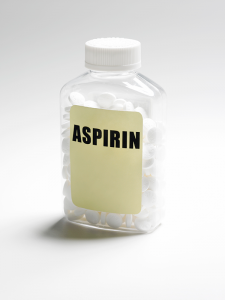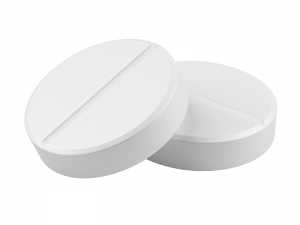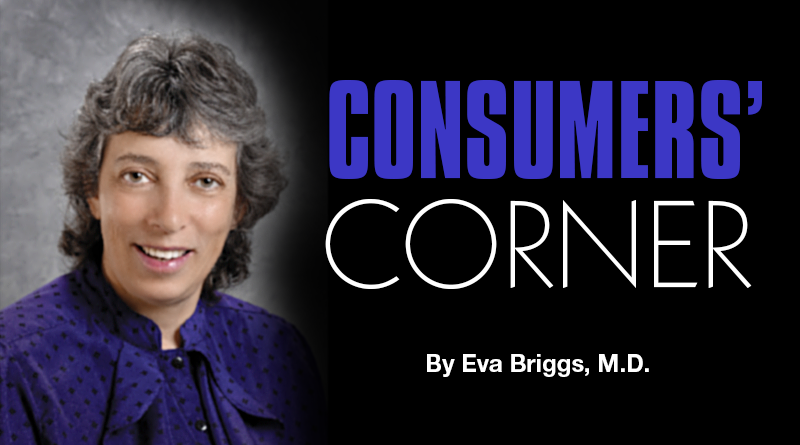The Miracles of Aspirin
It treats fever, plain, inflammation and helps prevent heart attacks — but it also brings serious risks to those who take it. Check with a doctor before you take it
By Eva Briggs, M.D.
 I often see patients who are taking aspirin every day to prevent heart disease or stroke. Sometimes that is the result of a well thought out decision made with the assistance of the patient’s primary care provider. But as often as not, someone hears that aspirin is good for the heart and just decides to start without medical advice.
I often see patients who are taking aspirin every day to prevent heart disease or stroke. Sometimes that is the result of a well thought out decision made with the assistance of the patient’s primary care provider. But as often as not, someone hears that aspirin is good for the heart and just decides to start without medical advice.
What is aspirin?
The chemical name is acetyl salicylic acid. The French chemist Charles Frédéric Gerhardt isolated it from willow leaves in 1853. But it has been used in botanical form for more than 2,000 years. In the latter half of the 1800s chemists developed better ways to synthesize aspirin and by 1899 the Bayer company was marketing aspirin commercially. In fact, Aspirin was initially Bayer’s trade name. Worldwide aspirin consumption today is 44,000 tons.
Aspirin treats fever, pain and inflammation. Aspirin also inhibits the function of platelets, a blood component important for clotting. It prevents platelets from clumping together. One of the steps in a heart attack is formation of a blood clot in a narrowed or diseased coronary artery. That’s the rationale behind using aspirin to prevent heart attacks.
The downside is that aspirin can cause serious side effects — like ulcers, gastrointestinal bleeding or brain bleeding. The benefit, preventing cardiovascular disease, must be weighed against the risk of serious side effects.
Factors that predict who is likely to benefit from aspirin therapy include age, cardiovascular disease risk, life expectancy, other illnesses and whether someone is willing to take medicine long-term.
The U.S. Preventative Services Task Force (USPSTF) currently recommend using aspirin to prevent cardiovascular disease in persons 50-59 years old, with a 10 percent or greater risk of cardiovascular disease in the next 10 years, no increased risk of bleeding, and who are willing to take aspirin for at least 10 years.
The age of 50-59 is based on the fact that statistically, this is the age group most likely to benefit from taking aspirin to prevent heart disease. That’s the age when the risk of cardiovascular disease is rising but patients still have long enough life expectancies to benefit from taking aspirin.
The USPSTF recommends that people ages 60-69 who met the other criteria can consider aspirin on an individual basis, since the benefit is likely to be smaller than for younger patients.
How do you calculate your risk of heart disease in the next 10 years? You can use an online calculator from the American College of Cardiology — http://tools.acc.org/ASCVD-Risk-Estimator/
Risks for bleeding include dose and duration of aspirin use, history of ulcers or upper gastrointestinal pain, kidney failure, severe liver disease, low platelet count, bleeding disorders and diabetes. Bleeding risk also increased using aspirin with nonsteroidal anti-inflammatory drugs (such as ibuprofen or naproxen) or with anticoagulants. The risk of bleeding is also increased by male sex, smoking, older age, and diabetes.
 So, just how helpful is aspirin in preventing cardiovascular disease?
So, just how helpful is aspirin in preventing cardiovascular disease?
One study estimates that for men aged 45-54, one heart attack will be prevented for every 1,786 men taking aspirin for one year. But one major GI bleed will occur for every 1,344 men who take aspirin for one year. For men aged 75–84, 511 taking aspirin for one year would prevent one heart attack, but one out of 202 men treated would have a major GI bleed.
Given these numbers, it’s best not to start taking aspirin without a discussion with your doctor about your individual risk for cardiovascular disease and bleeding, and how likely aspirin would help you.
One final tip: if you are having heart attack symptoms, don’t treat yourself with aspirin and then wait to see if it helps. Get to an emergency room right away!
Eva Briggs is a medical doctor who works at two urgent care centers (Central Square and Fulton) operated by Oswego Health.

